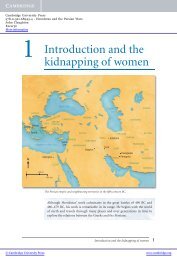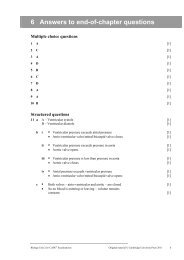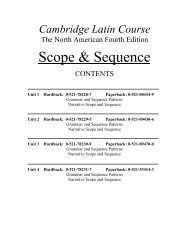Brad Philpot - Cambridge University Press
Brad Philpot - Cambridge University Press
Brad Philpot - Cambridge University Press
Create successful ePaper yourself
Turn your PDF publications into a flip-book with our unique Google optimized e-Paper software.
Part 3 – Literature: texts and contexts<br />
Figure 6.5 Albert Camus (1913–60), a<br />
source of inspiration for John Fowles.<br />
146<br />
There are, of course, many literary movements, and not just that of modernism that<br />
you have looked at so far in this unit. The following is a list of some other literary<br />
movements.<br />
beat poetry<br />
Dadaism<br />
existentialism<br />
First World War poetry<br />
Harlem renaissance<br />
imagism<br />
lost generation writers<br />
metaphysical poetry<br />
modernism<br />
post-colonialism<br />
post-modernism<br />
realism<br />
Renaissance<br />
Romanticism<br />
surrealism<br />
Victorian literature<br />
Activity 6.4<br />
As you study the contexts in which your Part 3 texts were written, you will want<br />
to learn more about the sources that inspired the authors. Albert Camus, Jean-<br />
Paul Sartre, the ideas of existentialism and the Theatre of the Absurd inspired<br />
John Fowles. Read Text 6.5, an extract from The Stranger by Albert Camus, to see<br />
how Fowles might have been inspired. Find out about existentialism and the<br />
Theatre of the Absurd in order to gain a deeper understanding of both Texts 6.4<br />
and 6.5. Here are some questions to consider when comparing and contrasting<br />
the two texts:<br />
1 How are the personal lives of the authors different? How are they similar?<br />
Can you see how their lives are reflected through their writing?<br />
2 Both stories are told in the first person, or the ‘I’ form, from the perspective of<br />
the main characters (the murderers). How are Frederick Clegg and Meursault<br />
similar in their thoughts and actions? How are they different?<br />
3 Read the short summaries of the main ideas of existentialism and the<br />
Theatre of the Absurd. Can you find evidence of these ideas in the two texts?<br />
Existentialism<br />
A philosophy that focuses on the condition of the individual person: their<br />
thoughts, emotions, responsibilities and actions.<br />
Only an individual can give their life meaning.<br />
In order to give their life meaning, the individual must overcome existential<br />
obstacles such as fear, alienation, boredom and absurdity.<br />
Sample<br />
The Theatre of the Absurd<br />
A movement comprising plays written by playwrights who believed human<br />
existence has no meaning in a godless world.<br />
The mismatch between people’s urge to give their lives meaning and the<br />
meaninglessness of life often results in absurd situations.<br />
Text 6.5 The Stranger, Albert Camus, 1942<br />
Albert Camus came from a poor, pied noir family (of French origin) in Algeria. His<br />
father died in the First World War; his mother, of Spanish descent, was half deaf. Just<br />
years after joining the French Communist Party in 1935, Camus was kicked out for<br />
© <strong>Cambridge</strong> <strong>University</strong> <strong>Press</strong> 2011








